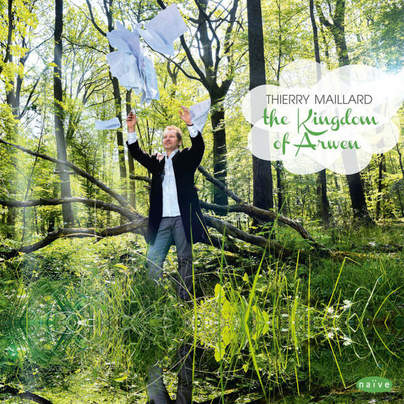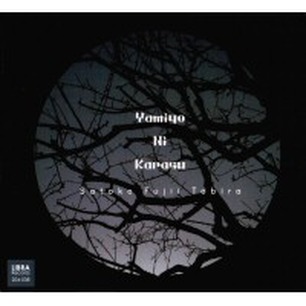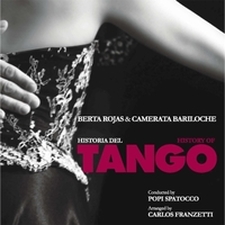
Label: Naïve Records
Scheduled Release Date: September 25, 2015
The Trio: Thierry Maillard : Piano, composition, arrangement and orchestration
Yoann Schmidt : Drums
Dominique Di Piazza : Bass
The Soloists: Didier Malherbe: Duduk, Flutes Minino Garay : Percussions
Olivia Gay : Cello
Nguyên Lê : Guitar
Neil Gerstenberg: Whistle
Taylan Arikan: Bağlama
Marta Kloučková: Vocals
All tracks composed by Thierry Maillard.
Mixing at the Studios de Meudon by Julien Bassères. Mastering by Mark Haliday.
After 2014’s critically acclaimed and hugely successful album “The Alchemist,” Thierry Maillard and his trio have recorded “The Kingdom of Arwen” on the Naïve Label. In addition to the trio is the Prague Philharmonic Orchestra under the baton of Jan Kucera. The scheduled release date is September 25, 2015.
The trio is Maillard on piano with Dominique Di Piazza on bass and Yoann Schmidt returning on drums. With such a centered and powerful core trio, the orchestra provides the lush and expansive backdrop to the intimate work of Maillard, Di Piazza and Schmidt.
Thierry Maillard is a flawless composer and arranger with 12 albums as a leader and many more as contributor and sideman. He studied at the Ecole Normale de Musique where he was instructed in piano and accordion and also learned music theory and analysis. His heart was drawn to composition and orchestration and, at the age of 17, discovered his love of Jazz. Later, he traveled to New York City to learn from the best.
Strings have been important to him from the beginning and, after forming a trio, added a string quartet to form 2000’s septet. This launched Maillard into a new direction of combining Jazz and Classical forms and instruments into a new expression. He has performed with such greats as John Patitucci, Dennis Chambers, Bireli La-grene, Chris Minh Doky, Bobby Shew, Débora Seffer, Michel Portal, Bernard Lubat, Didier Lockwood, Dominique Di Piazza, Matthew Garrison, and more. His performances are stellar and his bandmates are always top of the tier with “The Kingdom of Arwen” being no exception.
The album opens with “Ethnic Song.” The orchestra plays the role of the large Jazz ensemble. The lyrical chase between Jazzy styles rapidly crosses over cultural and natural barriers from Gershwin-like to Shostakovich-like with all brought into unity by Maillard’s gorgeous piano textures. The trio takes center stage with bassist Dominique DiPiazza and drummer Yoann Schmidt standing far in front of the orchestra and then engulfed by the waves of the orchestral arrangement.
“The World of the Elves” follows after. I’ve always imagined Tolkien elves as Jazz fans. Maillard paints elven landscapes with orchestral oils that do not wither or wear away. There is life, dignity and the slightest hint of melancholy. There is also a loving playfulness at work here. Maillard also sets forth a determination and resolve that is produced—late in the song—by fascinating chord changes. With that is a sylvan theme that carries the song away to conclusion. A sweet duo of piano and piccolo.
“The Kingdom of Arwen” is the title track and embodies an almost Middle Eastern feel to introduce the track. The double-reeds overtake the theme followed by dominant piano and strings who introduce the theme that carries the piece to the end. The orchestration is intriguing and imaginative. The piccolo, horns and strings with the trio assume the theme together that speaks of a delicate, fragile beauty.
The piece has an enigmatic charm that is enhanced by the staggered rhythms of Schmidt’s drums. Maillard’s own syncopated, percussive piano attack conjures images of a light-hearted Arwen, now in Lorien, now in Rivendel, and then as the regal Queen of the West while never forgetting her legacy as Elrond’s daughter and descendant of Luthien Tinuviel. In the end it speaks of Arwen’s long years alone after the passing of the King Elessar with an unspeakable effect on the listener.
“Heiroglyphs” follows with distinct Egyptian tonal motifs as captivating as Maillard’s own scorching piano work which surges ahead of all else. The Prague Philharmonic Orchestra is exquisite in their rich, lush, chimera-like accompaniment of the trio’s masterful treatment of the melody and rhythm. The orchestral dissonance in the trio’s break is invigorating. It is another fine example of Maillard’s dedication to Jazz insertions into classical forms.
“Sphynx (Part 1)” is a female voice (Marta Kloučková) intoning the introduction that is joined by Maillard’s solo piano. The Saharan landscape is imagined with the shifting wind of her voice and the mirage from the heat of the sand being captured in Maillard’s piano. The trio and orchestra leap into the music on “Sphynx (Part 2).”
On “Part 2” the melody is more pronounced, even strident. Piano, bass and drums anchor that melody and then assume it completely. The returning orchestra become the background for Maillard, Di Piazza and Schmidt. The nobility, the energy, the beauty and the legacy of the Sphynx are splashed across the imagination until the Sphynx is delicately obscured by the sands of the Sahara. It may be the most exciting piece on the album.
“The Highlands” is marked by the rhythm section creating a march as the pizzicato strings offer a chant as Maillard’s piano cries a woeful remembrance. The march to nowhere speaks of human failure without allowing for futility.
“Zappa” is extraordinary. You may think you know what to expect in a song with this title but you’re still not prepared. If Frank Zappa was anything, he was exacting and precise. Playing music by Frank Zappa is one of the most difficult things for any musician. Writing a tribute to Zappa with Zappa’s own craftiness is next to impossible. Thierry Maillard, however, has done it with splendid directness and daring.
Throughout the 10-minute piece, glimpses of Zappa’s motifs are caught while Maillard creates the emotional impact of our great loss from Zappa’s passing. Zappa was especially demanding for drummers. Maillard is merciless. Schmidt breaks away to different chronometrics than the orchestra and Maillard’s arpeggios. The guitar spot-on. If there is a life to come and if they who are there can hear us, then somewhere Frank Zappa is smiling with that wonderful smirk on his face.
“The Legend of Sparta’s King” comes next. There are few of Sparta’s kings that would inspire a song: Homer’s Menelaus, perhaps; Leonidas of Thermopylae, certainly, and two or three more. No matter which king, they all bore similar characteristics. Mostly farmers but all warriors. Their lives were anything but idyllic—they labored intensely in war and in peace.
The trio and orchestra weave a tapestry of love for home and dedication to country. With the lovely, even pastoral, melody there is a stamp and marching of soldiery until a horn blast calls to war. It is a lament of losing life and love in service of others.
“Between the Silence” is one of the most lyrically moving pieces of the album. It is an enchanting work of trio with orchestra as the trio never loses cohesion. In one or two quick moments, you hear Millard’s plosive vocalizations of rhythm and understated words spoken to himself.
The orchestra is vivid and creates a wide-eyed vision of the world while Maillard’s piano is penetrating and direct. It is an inspiring and invigorating work. The drama and pathos of life are expressed in the depths and rhythms and changes of the music.
“Trait d’Union” features Maillard’s piano that dominates from start to finish. He is a powerful player who can shift from aggression to passivity, from rawness to refined delicacy, in the space of a heartbeat. All of that is on full display here. Whether he is playing like Zeus’ thunderbolt or like Aphrodite’s whispers of love, Maillard is master over all. “Trait d’Union” is a Jazz triumph.
Thierry Maillard and his trio created an album of ineffable beauty with “The Alchemist.” Now with the Prague Philharmonic Orchestra under Jan Kucera on “The Kingdom of Arwen” they have coupled beauty with a vast tonal spectrum that allows Maillard to paint his compositions with wider hues and finer brushes. It indeed takes a full orchestra to offer him a full palette of colors. He uses those colors to perfection. In the end, the orchestra supports but never supplants the trio. In the end, it is Maillard’s superb compositions and arrangements that capture the attention and imagination.
Maillard the master pianist is also Maillard the inexorable leader and incomparable composer. “The Kingdom of Arwen” is a stunning work of Jazz emotion and Maillard is one of the most disciplined and romantic Jazz composers ever. I was not sure that Thierry Maillard could ever surpass the sheer beauty of "The Alchemist." It seems that Maillard knows no boundaries, even those that he himself sets.
~Travis Rogers, Jr. is The Jazz Owl
Visit his website at: http://www.thierrymaillard.com/
"Like" him on Facebook at: https://www.facebook.com/pages/Thierry‐Maillard/
Purchase "The Kingdom of Arwen" on MP3 at the Amazon link below.
If you missed "The Alchemist" it is also available on the appropriate Amazon link below.



 RSS Feed
RSS Feed
